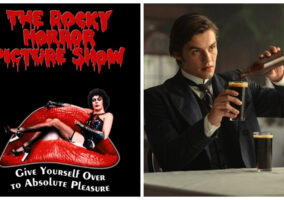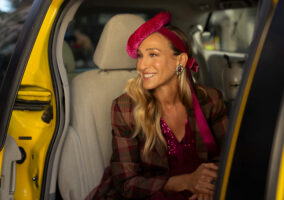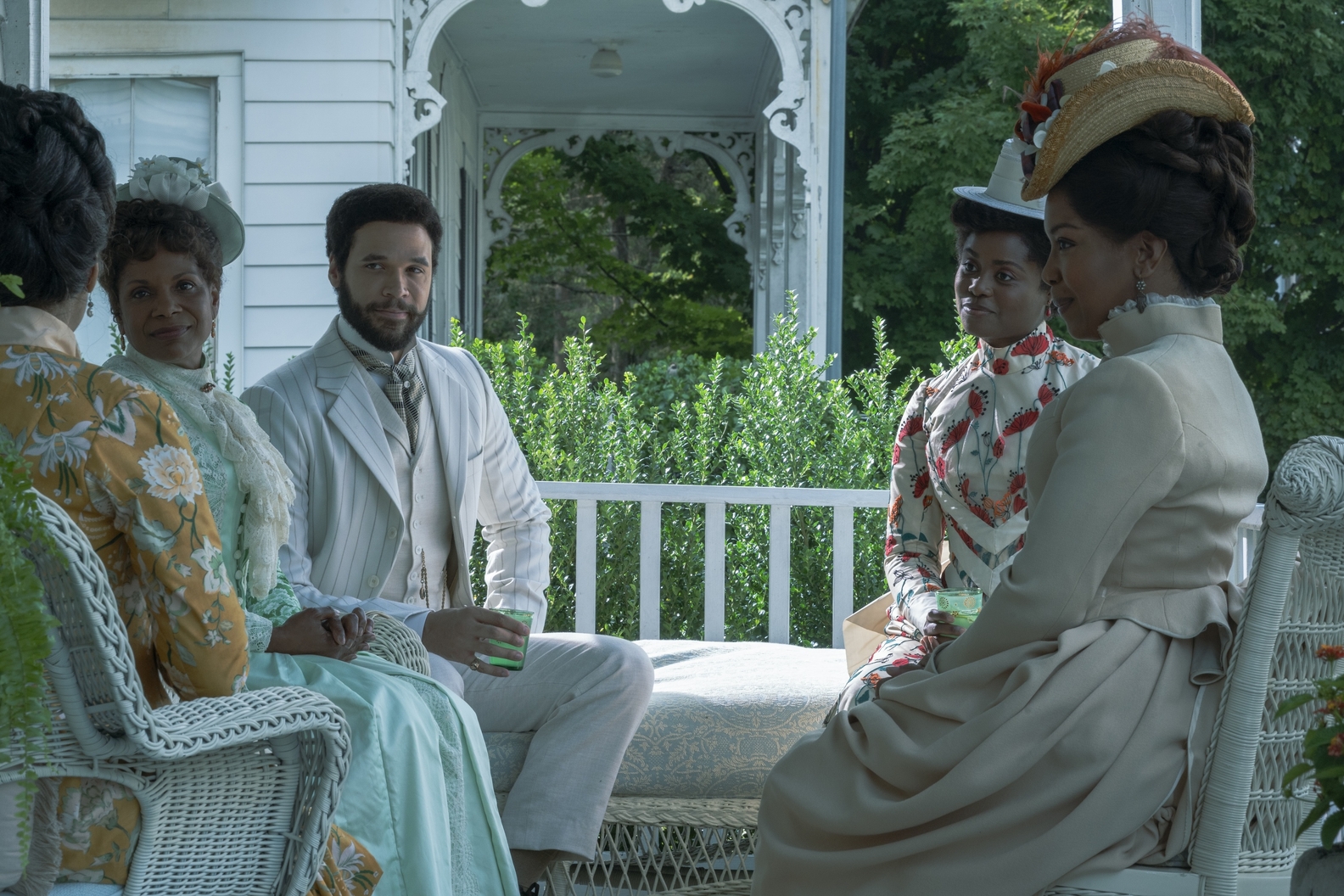
The big day has arrived! And just like all weddings, this episode brought in something old (Nathan Lane’s Foghorn Leghorn), something new (Merritt Wever as the worst houseguest in the world), something borrowed (just about every plot line), and something blue (take your pick: Mrs. Kirkland’s ugly hat or Marian’s not-terrible day dress). But first, something we have learned in our time recapping The Gilded Age is that our writing contains two phrases that repeat at a nearly embarrassing rate: “Agnes is beside herself” and “Bertha is in a frenzy.” We blame Julian Fellowes. Let’s start with the latter.
The wedding preparations are in full swing at the Russell house and Bertha is… in a frenzy once again. She gathers the entire household staff and reveals to them her master plan as to how to pull off the wedding of the century: “If you see someone, help them,” she says, like a tech bro giving a TED Talk. The servants all nervously side eye each other and shuffle their feet, embarrassed by the incredibly vague directive Fellowes scripted for their mistress. Adelheid pipes up and asks if Gladys will be coming down this day. Instead of slapping her for her impertinence, Bertha says “Miss Gladys has decided to use this time to rest before the event.” No one believes her. Also, the press is writing about Gladys’s underwear and Bertha is ready to have some servants beheaded over it.
Agnes is having a new dress made for the wedding (which honestly surprises us a little) and urges Ada to do the same, although she notes, in typical Agnes fashion, “It does seem odd that such an insignificant girl should be the center of New York’s imaginings.” Then they get into another argument about Ada paying the bills, which is pretty damn silly at this point because how else was Agnes going to walk out of there with a new dress? Agnes asks — rhetorically, she thinks — if she ever scrutinized Ada’s spending when she was paying the bills and Ada kindly opts to answer with a neutral-as-humanly-possible “Yes,” because Julian Fellowes will script scenes of high society women arguing about money if it suits his needs, but he won’t have one of them ask “Are you fucking kidding me?” when the occasion practically demands it. Agnes heads off to a charity luncheon, because that’s what you did after a trip to the dressmaker in those days, and Ada seems especially keen on the idea of having some alone time.
Across the street, they’re down one bridesmaid because Leonie Jerome can’t make it for some reason. Larry pushes for Marian to fill the slot, but Bertha makes it more than clear that Miss Brook simply doesn’t have the pedigree to be a member of her daughter’s wedding party. She eventually relents, but remember last week when we said that Larry is the only member of that house capable of putting her on her back foot? Evidently pissed at her for dissing his girlfriend, Larry needles her about inviting her sister, Monica, who is apparently the only one of her blood relatives the rest of the family have met, which is intriguing as hell.
Jack receives news that one of the clock investors would like a second meeting. Miss Armstrong suggests that they want to bring Jack in just to tell him how dumb he is. Upstairs, Mrs. Bauer is sitting at the dining room table (a MAJOR no-no) with Ada, who has received Madam Dashkova (a perfectly cast Andrea Martin), one of the many charlatan spiritualists milking the upper classes for cash at this time. Did we gasp when Agnes’s carriage puuled up to the house, even though her arrival couldn’t possibly have been more forecasted? Maybe. A little. Of course when she walks in on the scene and susses it out, Agnes is… beside herself once again. All things considered, we’re surprised by how little fireworks there were. She rather gently told Mrs. Bauer to get back downstairs and she astutely noted to Ada that Luke wouldn’t have supported this activity.
The Russell household staff meet to discuss the leaks to the paper and Church makes it clear that Mrs. Russell is ready to fire the whole staff. Adelheid suggests it might ne one of the dressmakers instead of the staff, which makes it exceedingly clear that Adelheid is the leaker because Fellowes simply doesn’t feel the need to be subtle or unexpected in any way.
Aunt Monica shows up, she’s Merritt Wever, she gets under Bertha’s skin just by breathing the same air, she knows this very well, and she’s perfect. The casting here is extremely on point, not just because of the resemblance, but because Wever has that exact same disconcertingly smooth way of talking that Carrie Coon uses to such effect. Bertha excuses herself from her sister’s oppressive presence and goes upstairs to verbally abuse her children, neither of whom are having it from her at the moment. She is, for once, beside herself. Worse, she’s something Bertha prides herself on never being: nonplussed. “You constantly seek to undermine me” she says to her giggling offspring, who are ignoring her while they play with knives and light the drapes on fire. Bertha begs Gladys to come downstairs and Gladys wonders if her mother will drag her to the church in chains.
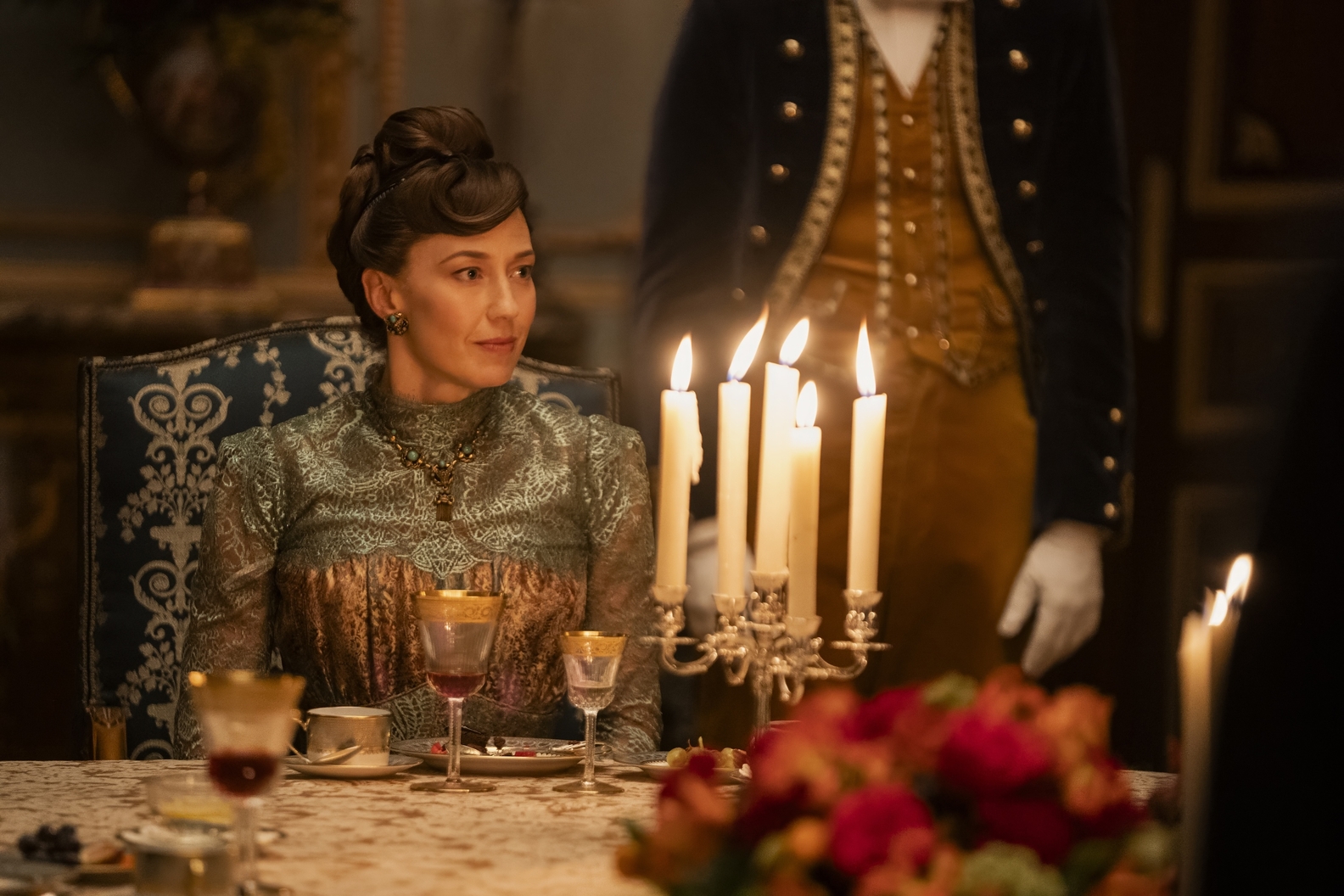
In Newport, Mrs. Kirkland is entertaining Peggy, her mother, and her aunt on the front porch while being a total bitch to all three of them. Once again, we have to tip our fussy little hats to the casting, because absolutely no one can deliver a cutting but genteelly delivered insult like Phylicia Rashad. She compliments Peggy on her writing and the strength of her convictions even as she openly wonders if such things can be considered proper or ladylike. There was one moment, however, when a flicker of pain passed across her face as Peggy declared with confidence that the vote for Black women would come in her lifetime; a subtle bit of silent acting that spoke of a character who never allowed herself to consider what changing the status quo might be like. She announces that she will be coming to Peggy’s upcoming talk.
“Why? I’m not a doll for you to dress. How many clothes do I need?” Bertha is trying to convince Monica to wear some of her old dresses because she only brought one dress with her and it’s hideous. Granted, most of the other dresses on this show are hideous, but Monica’s is hideous in a poor-person sort of way. She won’t have it, though; not because she’s insulted by her sister’s begrudging and mercenary charity, but because she thinks her sister’s six-dress-a-day lifestyle is nothing worth emulating. “So which is the throne room?” she asks her pointedly. Oh, we like this one.
Agnes surprises Marian by visiting her room. She somewhat excitedly announces that Gladys’s wedding gown is in the newspaper, but after a moment, her true reason for the visit is revealed. She questions Marian as to why she’d be asked to be a bridesmaid for the wedding and wonders if Mrs. Russell is setting her up as a suitable bride for her son. She correctly notes that she and Larry have been quietly courting and surprisingly, she has no issue with the match, but she’ll be firing cannons at the Russell manse from her rooftop Mary Poppins-style if she finds out Bertha doesn’t consider Marian suitable.
Jack and Larry visit the clock people and the level of detail Fellowes grants to business conversations is hilariously low even for him. “We want to buy your clock. For…three. Four? Okay, six, but you drive a hard bargain!” They shake hands and just like that, Jack is rich. He’s overwhelmed and tells Larry, who somewhat crassly notes that Jack is almost as rich as Mrs. Forte and much richer than Mrs. Van Rhijn. Later, Jack confides the news to Mrs. Bauer in a sweet and funny scene where he admits that he doesn’t want to leave service yet because the Van Rhijn house is the first home he ever had. Awww. She agrees to keep his secret for him, although we wouldn’t blame her for rubbing it in Armstrong’s face. It does seem somewhat notable that he hasn’t received any payment yet.
Peggy’s talk in Newport is a success. Aurora Fane attends and compliments her on her work. To our surprise, Peggy more or less asked her how she’s doing now that her husband’s kicked her out, which seems to indicate that the Fane divorce is common knowledge. “Who was that sad white lady?” Mrs. Scott asks her daughter as she leaves. Mrs Kirkland finally manages to get Mrs. Scott worked up when she refers to Mr. Scott as “not an important man,” and mentions that “his history” is so different from hers, which is rude to the point of straining credulity for this setting. She leaves with her son and Mrs. Scott has to be restrained from spitting at her. Peggy isn’t pleased to hear that her parents have been arguing over Mrs. Scott. It’s fascinating to see a story about colorism and prejudice against the formerly enslaved in elite Black Newport, but we can’t help noting that Mrs. Kirkland was offensive in a way Fellowes never allows his white upper-class people to be. Just look at this scene, which focused on the kind but suffering Mrs. Fane and the rude and prejudiced Mrs. Kirkland. Racist and colorist attitudes are voiced rarely on The Gilded Age, and only by openly villainous characters, instead of being presented as the conventional, widespread beliefs they were.
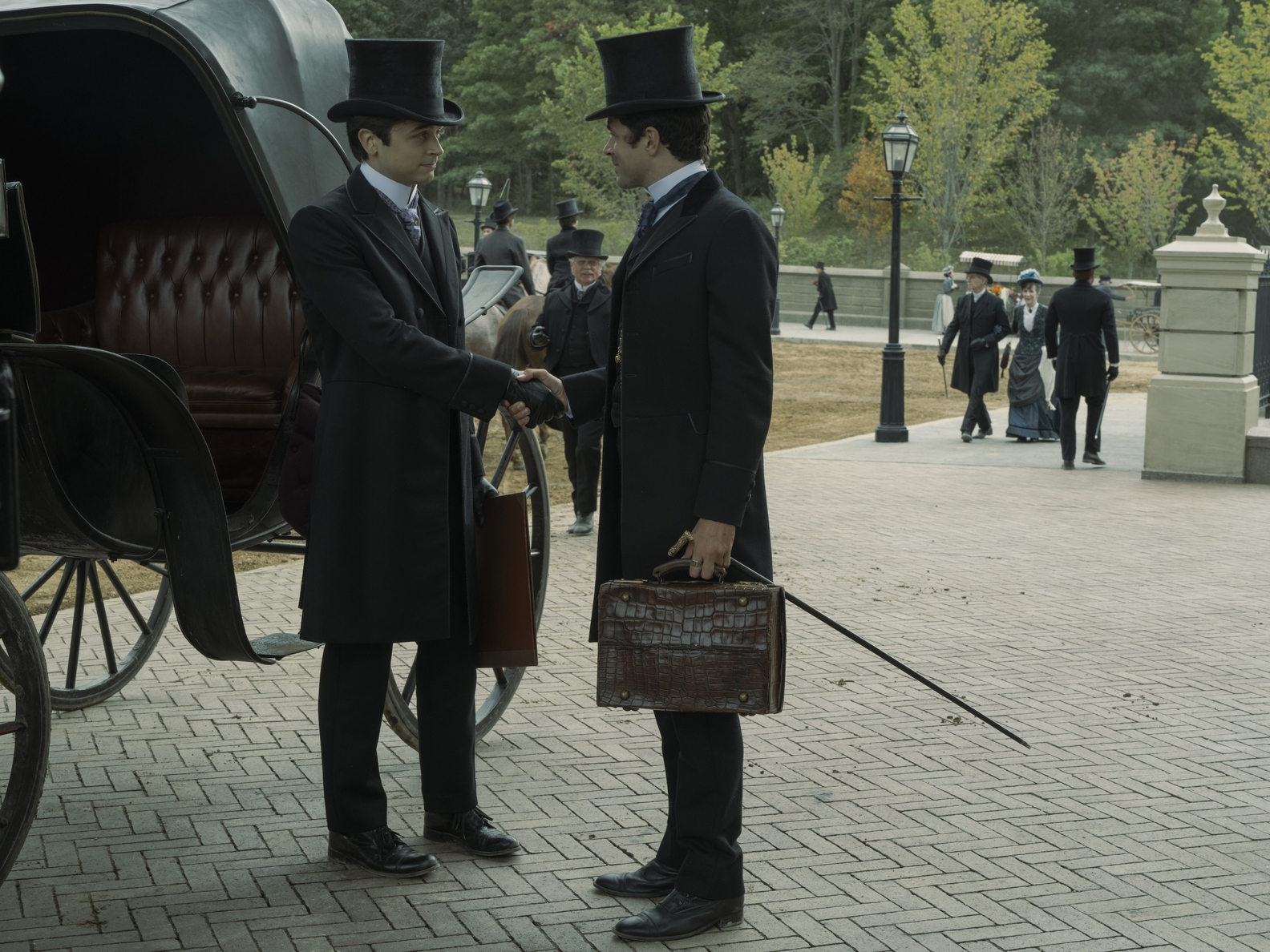
Dinner at the Russell household, as they entertain the Duke, his hatchet-faced sister, and Monica, who takes every opportunity to be as irritating as possible to Bertha. We think we love her. While it’s possible she’s the hick she appears to be, we think she ramped up the crass Americanisms just to start a little trouble. She knows her sister very well and she doesn’t approve of what she’s become. Bertha also knows her sister well, which is why she got Church to give her the secret exploding coffee cup in the Russell china registry. After dinner, Hot Beard pays a visit to his wife’s bedroom to show off how hot he looks in his killer dressing gown. He realizes that she rigged the coffee cup and notes, in the first truly self-aware statement from either of them, that they’re both ruthless people. For some utterly ridiculous reason, they decide to have yet another debate about their daughter’s arranged marriage, which is due to take place within hours. This storyline has repeatedly attempted to cast George as the kinder parent but he never actually does anything to earn that reputation. He just sighs a lot. If he truly wanted to do as Gladys wished, he’d have put the kibosh on the whole thing a long time ago. Scenes like this one insult the viewer’s intelligence. At this stage, even George would be fully on board.
On the day of the wedding, Gladys continues to refuse to come down. Again, while we understand that someone might not be thinking clearly in this situation, we don’t get why she agreed to appear at the announcement of her engagement, if she was going to continue to mope about it and act as if it were optional. Bertha calls upon Marian to come over and “help her grasp this opportunity on offer.” This might work out well for Marian, who clearly needs an in with Mrs. Russell and seems extremely intimidated by her. Upstairs, she notes accurately to Gladys that if she backed out now, the story would go global and follow her for the rest of her life while somewhat weakly defending the success of arranged marriages for their class. As an aside, Adelheid is clearly the one feeding the stories to the papers. She’s the one staff member most in a tizzy about it and she’s the one who suggested it was probably one of the dressmakers. When she comes in with food for Gladys, she jokes about not eating so she can faint at the wedding and we suspect that detail may wind up in the papers. Gladys mentions that she won’t be bringing Adelheid to stay in England to be her ladies maid, which gives her every reason to want to throw a spanner in the works. Marian may wind up being the one who solves this mystery for Bertha.
J.P. Morgan shows up at the Russell mansion to bark at Hot Beard through his mustache. “Your plan is in crisis!” That’s it in terms of details. Morgan is mad because something-something run on the banks something you’ll-be-the-ruin-of-us-all something. He takes his mustache with him and leaves. The bottom line (pun intended) is that Hot Beard might be poor soon. Not that $300,000 is likely to solve his problems, but Jack better get that payment before George starts hitting Larry up for money or pulling from Gladys’s dowry. Doesn’t Marian have a bunch of supposedly useless railroad stock? If there’s one trope Fellowes loves more than any other, it’s giving sudden windfalls to already-wealthy people. And if there’s one thing we know for sure, it’s that Hot Beard will never be poor while Julian Fellowes is writing him, so it’s just a matter of finding which ridiculously unlikely pipeline of money to keep that from happening.
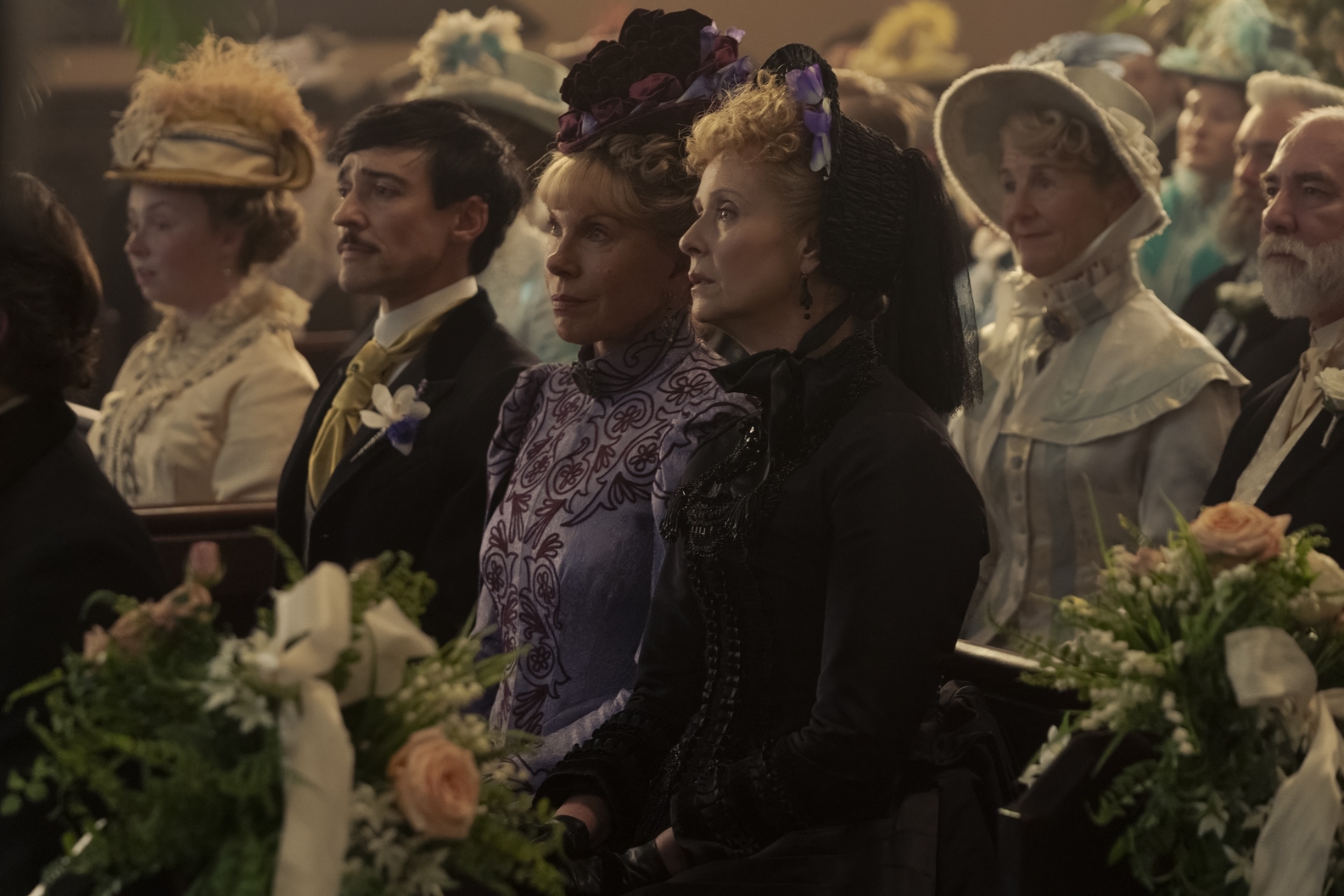
And if there’s another thing Fellowes loves, it’s giving servants secret family members. We burst out laughing when Mrs. Bruce told the not-French chef that she can’t marry him because she has a husband. Of course she does. The not-French chef had a secret wife, the valet had a secret daughter, and the secretary had a secret baby. He won’t stop until every member of every household staff unveils some heretofore unseen blood relative who’s been kept in a box somewhere.
And now, drama in the Astor household. Donna Murphy has been a fun, bitchy presence on the sidelines as Mrs. Astor, but the sudden focus on her own domestic problems just feels like it’s coming out of left field. We suppose the drama of the Drayton marriage makes a nice bit of side commentary about relationships among the upper class during a wedding episode, but none of this was remotely interesting. The viewer has had almost no time with Charlotte Astor and none whatsoever with her husband or purported lover so nothing about this scene was interesting. At the wedding, Ada deliberately mentions the report in the paper to her and we don’t quite get why she did that. Granted, it was right after Lina insulted Mrs. Russell, but why would that make Ada do something so socially reckless? She must have realized she doesn’t matter to Lina, who wound up getting mad at Agnes and Bertha instead.
We’ll give director Michael Engler credit. He dragged out Gladys’s decision for so long that we actually started entertaining the idea that this wedding wasn’t going to happen. But it did, of course; taking its cues from the real wedding of Consuelo Vanderbilt, who also famously walked the aisle crying under her veil. We figure they must have burned through the budget on this episode with all of the flowers and hats, so we cut directly to the saddest wedding night in history instead of getting to see one second of the reception. Fellowes has been writing the Duke as fairly unknowable; sometimes coming across sinister and sometimes coming across sensitive, but it’s clear he and his Wicked Witch sister have some sort of secret that’s likely to make Gladys’s life hell. Her “Try not to laugh” to him just before the vows seemed awfully sinister, as was her offense to the suggestion that she move out of Sidmouth Castle. We didn’t think the show was likely to follow Gladys’s adventures in England, but we can’t imagine this storyline is dropping suddenly, so we’ll just have to go and see where she winds up. If Fellowes had any sort of sense of humor, he’d have the Duke pull up to Highclere castle next episode and say “Welcome to Sidmouth, darling.”
Catherine, Princess of Wales in Self-Portrait at Wimbledon Next Post:
Dsquared2 Spring 2026 Menswear Collection
Please review our Community Guidelines before posting a comment. Thank you!

